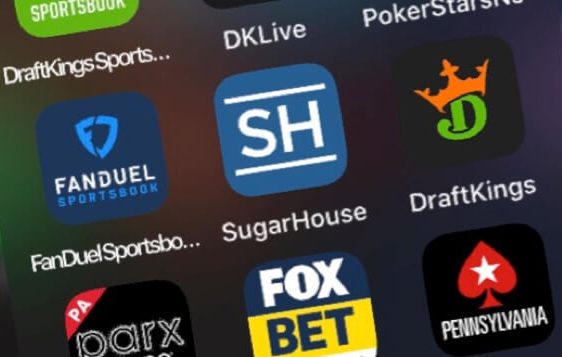Betting apps can lead to big losses

April 24, 2022
As I watched the White Sox get bullied by the Tampa Bay Rays, and the Chicago Bulls lose a close playoff matchup against the Milwaukee Bucks on Easter Sunday, my television screen was bombarded by a certain group of commercials. It seemed that every commercial break I was seeing ads for some apps or online websites called FanDuel, Draft Kings, or Bet MGM. Commercials that include notable celebrities like retired NFL quarterback Drew Brees, retired NFL running back Jerome Bettis, NBA great Shaquille O’Neal, and even Ben Affleck, promoted the use of sports gambling apps to me and the other thousands of people watching NBC Sports. Even while scrolling through my phone late at night, I have seen more ads for betting apps like Barstool Sportsbook and many others.
In 2018 the Supreme Court lifted their ban on sports betting, and year by year more states have legalized the activity. According to statistics compiled by Statista, 20 percent of males surveyed have partaken in the act of sports betting. With such a large abundance of people potentially partaking in this activity it would be logical to believe that they are making a very good return on their bets, right? Wrong, according to Bet India only around 53 to 54 percent of all sports bets win. Something is fishy about that however, because if people win a majority of the time there is no way any sports betting business can continue to profit. One thing that makes these businesses profitable is that all of these small wins that betters earn give them false hope. If I were to place and win a $5 bet two days in a row, I might just up the stakes to a $30 bet, and boom. I lost that bet. Now, although I have won two-thirds of my bets, I lost money. It is the constant cycle of win, hope, and failure that keeps these businesses profitable. The winning and hope keep the people coming back, and the failure reels in more money for the casino giants.
Another piece of the puzzle that give casual sports fans and bettors false hope is the over exposure to big wins and betting philosophy. I went on YouTube and searched, “how to win sports bets,” I filtered it by the past week and scrolled for nearly ten minutes before there were no more videos I could watch to improve my betting “skills.” There were videos on certain bets to pick, what type of bets to pick, what apps to do them on, and many other seemingly tips. There are far too many people with advanced knowledge of sports who are pushing their beliefs or strategies for winning sports bets. Although the videos may be made with good intentions and to help other bettors win, in reality they are just giving bettors false confidence in their abilities to make it big like YouTuber Shane Huang or all of the other thousand sports betting “masters” on YouTube. One thing that is also wrong about the social media influence on sports betting is that many video creators get sponsored by these betting sources and are paid to promote them or even lie in order to gain more users.
Another problem with the world of sports betting is the over-glorification of winning bets by social media powerhouses. When the Cincinnati Bengals recently played against the Los Angeles Rams in the Super Bowl, all of the big Instagram accounts were posting about someone named “Mattress Mack” who placed a $5 million bet on the Bengals to win. Similar to the overconfident social media betting masters, the glorification of the bet made by Mattress Mack gave thousands of people false confidence in their betting abilities. One might think: “Since Mattress Mack is willing to bet $5 million I may as well bet twenty.” The problem here is that Mack made this bet and many others because of the media attention he gains. This helps his mattress business prosper so he inevitably wins somehow. Normal bettors, however, lack the certainty of winning that Mack has.
With all of that being said, sports betting is a bad bet. Sure, you may win here or there however in the long run sports betting will only ever give you a momentary feeling of winning until you bet the monetary reward again and again. With every addiction, desire will prevail against knowledge and you will continue giving in to the temptation of betting if you so choose to start.
